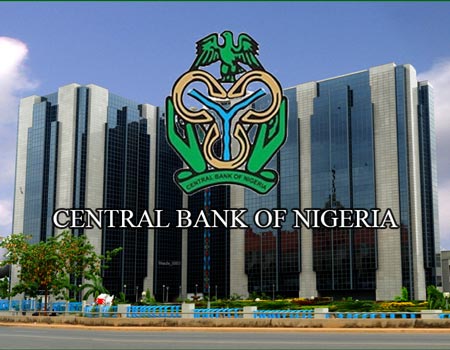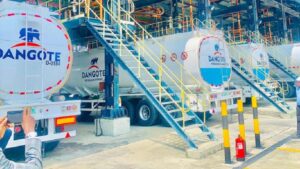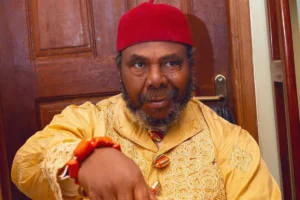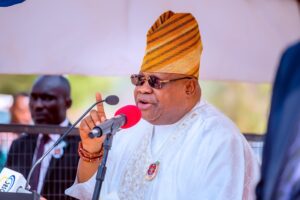New Policy Direction… 1,358 Projects Threatened As CBN Stops Intervention Funding
With the Central Bank of Nigeria (CBN) ending all its development finance interventions by the end of this year, more than 4.6 million farmers along with over 1,358 projects that had benefitted from the various initiatives will have to commence the repayment of the over N5.25 trillion loans given out by the apex bank over the years, LEADERSHIP checks reveal.
CBN governor, Dr Olayemi Cardoso, had stated his plan to deviate from the path of development finance interventions which his predecessors toed, stating that the apex bank will, under his leadership, focus on monetary policy and advisory roles.
Cardoso was brought in as the governor of the CBN by the President Bola Ahmed Tinubu administration after the suspension and subsequent prosecution of the former governor, Godwin Emefiele, as well as the removal of the acting governor, Adebisi Shonubi.
Before Cardoso’s appointment, the CBN, under the previous governors, had embarked on development finance programmes and policies, one of which was the removal of some items from the eligibility list for foreign exchange.
The ban on 43 items had been initiated under the leadership of Sanusi Lamido Sanusi and had been fully implemented during Emefiele’s tenure.
The CBN had delved into encouraging backward integration through the Anchor Borrowers Programme (ABP) that has seen over N1.09 trillion lent to more than 4.6 million farmers all over the country.
Read also: Amend Mental Health Act To Include Traditional Healers, Scholar Tells FG
Naira Falls To N1205/$ In Parallel Market
Naira Falls To N1205/$ In Parallel Market
Moment Wizkid Visits Surulere, Makoko To Distribute N100 Million For Christmas
In total, the CBN had given out more than N5.25 trillion to individuals and companies of various categories.
According to data sourced from the apex bank, the funds had been disbursed under several intervention programmes such as the ABP, the 100-for-100 Policy on Production and Productivity, the Nigerian Electricity Market Stabilisation Facility, N1.0 trillion Real Sector Facility, Agribusiness/Small and Medium Enterprise Investment Scheme (AGSMEIS) and Micro, Small and Medium Enterprise Development Fund (MSMEDF) amongst others.
As of May this year, the CBN under the Real Sector Facility had disbursed a cumulative amount of N2.56 trillion to 462 projects across the country, comprising 257 manufacturing, 95 agriculture, 97 services and 13 mining sector projects.
Aside this, more than 4.6 million smallholder farmers had benefited from the ABP under which a total of N1.09 trillion had been disbursed to farmers cultivating or rearing 21 agricultural commodities on an approved 6.02 million hectares of farmland across the country.
The 100-for-100 PPP had been introduced in November 2021 to stimulate investments in Nigeria’s manufacturing sector with the core objective of boosting production and productivity, necessary to transforming and catalysing the productive base of the economy.
As of May this year, cumulative disbursement under the facility stood at N173.31 billion, disbursed to 81 projects comprising 45 manufacturing, 23 agriculture, five healthcare, and eight services sector projects with an estimated 23,343 direct jobs created.
Also, the apex bank through the Commercial Agriculture Credit Scheme (CACS) had disbursed a cumulative N745.31 billion for 680 projects in agro-production and agro-processing, while total disbursements under the Agribusiness/Small and Medium Enterprise Investment Scheme (AGSMEIS) and Micro, Small, and Medium Enterprise Development Fund (MSMEDF) interventions stood at N150.22 billion and N96.08 billion, respectively.
Under the Nigerian Electricity Market Stabilisation Facility (NEMSF-2) for capital, and operational expenditure of distribution companies (Discos), the Bank disbursed a total of N254.39 billion to ease liquidity constraints and support the recovery of legacy debt.
Under the Export Facilitation Initiative (EFI), the Bank funded export-oriented projects with the cumulative sum of N44.58 billion as it disbursed under the Healthcare Sector Intervention Facility (HSIF), a total of N135.56 billion for 135 projects in the healthcare sector where 33 pharmaceuticals, 60 hospitals and 42 companies in other services benefited.
Cardoso, at the beginning of his tenure, had stated that CBN’s forays into development financing had been such that the lines between monetary policy and fiscal intervention have blurred. Thus, he said, in refocusing the CBN to its core mandate, there is a need to pull the CBN back from direct development finance interventions into more limited advisory roles that support economic growth.
Speaking at the 2023 Bankers Dinner in Lagos, Cardoso said the apex bank before his assumption of office had forayed into fiscal activities under the cover of development finance activities.
“There was also a lack of clarity in the relationship between fiscal and monetary policies, among other challenges.
“Hitherto, the CBN had strayed from its core mandates and was engaged in quasi-fiscal activities that pumped over N10 trillion in the economy through almost different initiatives in sectors ranging from agriculture, aviation, power, youth and many others. These clearly distracted the Bank from achieving its own objectives and took it into areas where it clearly had limited expertise.”
According to him, the primary mandate of the CBN is to ensure price stability, in addition to other objectives such as issuing legal tender/ currency, safeguarding external reserves, promoting a sound financial system, and providing economic and financial advice to the government.
“In line with our strategy to refocus on our core mandate, the CBN will discontinue direct quasi-fiscal interventionist activities and instead utilise orthodox monetary policy tools for implementing monetary policy,” he said.















Post Comment